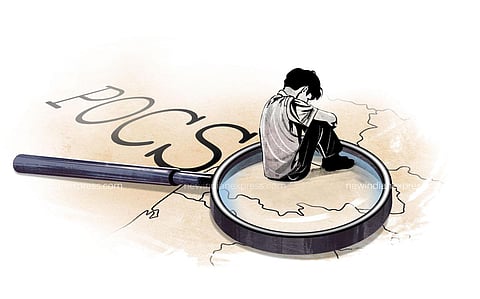

CHENNAI: On May 22, 2012, Parliament passed the Protection of Children from Sexual Offences (POCSO) Act, which came into force on November 14 of the same year. Ten years later, Tamil Nadu stands ahead of other States in terms of reporting of cases and conviction of the accused. However, the State’s activists say that much more can be done.
The POCSO Act is not governed by a single monitoring authority like some other laws. Its implementation rests on the collaboration of several departments including the social defence, school education, health, child protection units, police, helplines, counsellors, NGOs and the judicial system. Aside from issues related to delay in the delivery of justice, and gaps in raising awareness on the part of stakeholders, a greater focus on the prevention of sexual violence against children is the need of the hour.
A Devaneyan, a child rights activist, points out. “It is high time we talk about prevention, for which convergence is very important. Collective work from all departments is necessary.” To begin with, school textbooks must have a chapter on the Act, not to scare children but to educate them, he said.
Need for after-school care
Vidya Reddy, founder and director of Tulir - Centre for the Prevention and Healing of Child Sexual Abuse (CPHCSA), said, stakeholders find it difficult to discuss sexual offences and miss out on sex education, or topics like sexuality. “Talking about safe and unsafe touch with children is not enough.”
“Children whose parents work are usually left on their own after school, and this heightens vulnerability. A good after-school care programme, would be a step toward prevention as it would reduce risk factors such as perpetrators approaching children,” said Vidya. For instance, in Vietnam, after class hours, campuses transform into spaces for after-school care with new personnel.
In settings like camps, hospitals and schools where children congregate, proper screening should be implemented to ensure safety, Vidya explained. As per School Education Department’s G.O. 83 which was passed last year, every teacher must be provided training on child protection, and institutions must address sexual violence. Unfortunately, this has not gone forward.
‘Govt to conduct studies’
“As per 2020 NCRB data, over 90% of perpetrators are people known to victims. Prior to the Act, a study was conducted in 2007 on child sexual abuse, but the percentage has not gone down,” said Devaneyan. Along with other activists, he believes that a study on perpetrators can prevent cases of violence against children. “We need to know the whats and whys of an accused’s mind,” he said. Government bodies must conduct studies, and submit a report.
Professional perpetrators are people who chose the profession that gives them access and proximity to children, said Vidya. “In cases of teachers accused of abusing students, during the trial, the system must ensure the person does not end up in another child-serving facility.”
According to Vidya, with response mechanisms finally being put in place, talking about perpetrators of abuse offline and online, is the need of the hour. With the infiltration of technology, the field for grooming practices by perpetrators reaches further into the lives of young people without safeguards than ever before,” she said.
(This is part of a series of stories assessing the POCSO Act a decade after its passage)